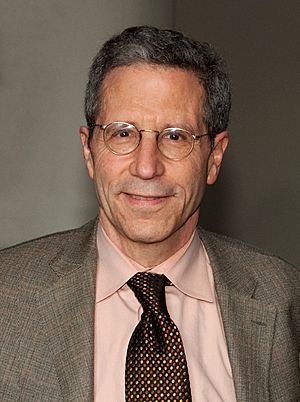Eric Maskin facts for kids
Quick facts for kids
Eric Maskin
|
|
|---|---|

Maskin in 2009
|
|
| Born | December 12, 1950 New York City, U.S.
|
| Institution | Harvard University Institute for Advanced Study Massachusetts Institute of Technology Princeton University University of Cambridge |
| Field | Game theory |
| Doctoral advisor |
Kenneth Arrow |
| Doctoral students |
Abhijit Banerjee Drew Fudenberg Robert W. Vishny Mathias Dewatripont David S. Scharfstein Jean Tirole |
| Contributions | Mechanism design |
| Awards | Nobel Memorial Prize (2007) |
| Information at IDEAS / RePEc | |
Eric Stark Maskin (born December 12, 1950) is an American economist and mathematician. He is famous for his work in a field called mechanism design. This field helps design rules for how people or groups can make decisions together.
In 2007, he won the Nobel Memorial Prize in Economic Sciences. He shared this important award with Leonid Hurwicz and Roger Myerson. They were honored for creating the basic ideas of mechanism design theory. Today, Eric Maskin is a professor of economics and mathematics at Harvard University.
Contents
Early Life and Education
Eric Maskin was born in New York City on December 12, 1950. He grew up in Alpine, New Jersey. He finished high school at Tenafly High School in 1968.
He then went to Harvard College, where he earned a degree in mathematics in 1972. He continued his studies at Harvard University. There, he received a master's degree in applied mathematics in 1974. In 1976, he earned his Ph.D. (doctorate) in applied mathematics. During 1975 and 1976, he also studied at Darwin College, Cambridge in England.
Career and Economic Ideas
After finishing his Ph.D. in 1976, Eric Maskin became a research fellow at Jesus College, Cambridge. The next year, he started teaching at the Massachusetts Institute of Technology (MIT). In 1985, he returned to Harvard University as a professor. He stayed there until 2000.
In 2000, he moved to the Institute for Advanced Study in Princeton. He also directed a summer school for economics in Jerusalem. In 2011, Professor Maskin returned to Harvard University. He is now an Adams University Professor there.
Key Areas of Study
Professor Maskin has explored many different areas in economics. These include game theory, which studies how people make choices when their success depends on others' choices. He also works on the economics of incentives and contract theory.
He is especially known for his work on mechanism design. This involves creating rules or systems to achieve specific goals, like fair elections or efficient markets. He also studied dynamic games, which are games that unfold over time. With another economist, Jean Tirole, he developed the idea of "Markov perfect equilibrium."
His research has looked at how different voting rules work. He has also studied why there is inequality in society. Another area of his work is how groups or "coalitions" form.
Awards and Recognition
Eric Maskin is a member of several important academic groups. These include the American Academy of Arts and Sciences and the Econometric Society. He was the president of the Econometric Society in 2003.
In 2014, he was a visiting professor at Covenant University in Nigeria. In 2017, he received an honorary professor title from HEC Paris. He also helped judge the Social Sciences category for the Infosys Prize in 2018. He is currently the chairman of the advisory board for the International Economics Olympiad.
Views on Software Patents
Eric Maskin has shared his thoughts on software patents. He believes that these patents might actually slow down new ideas, rather than help them. He argues that industries like software and computers have grown very quickly even without strong patent protection in the past.
He suggests that in fast-changing industries, patents could reduce overall innovation. This is because new ideas often build on older ones. If every small idea is patented, it can make it harder for others to create new things. He and his co-author, James Bessen, studied this. They found that when software patents became more common in the 1980s, it did not lead to more research and development.
Images for kids
See also
 In Spanish: Eric Maskin para niños
In Spanish: Eric Maskin para niños


